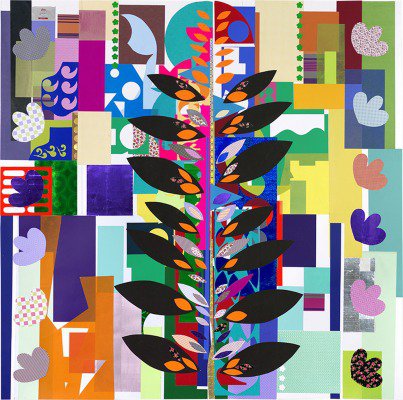Beatriz Milhazes
dal 12/3/2015 al 19/5/2015
Segnalato da
12/3/2015
Beatriz Milhazes
White Cube, Hong Kong
For this exhibition the artist has produced a new series of collages and painting that continue the artist's unique pictorial language, combining the dual influences of Brazilian and European Modernist abstraction.

‘I want to have optical movements, disturbing things; such visions that your eyes would be disturbed when you see them.You don't have the real center of the composition, and your eyes are always moving...That way, I feel like you have a communication with the entire world.’
Beatriz Milhazes (RES Art World / World Art, No 2, May 2008)
White Cube is pleased to present an exhibition by Brazilian artist Beatriz Milhazes. For this exhibition, her first in Hong Kong, Milhazes has produced a new series of collages and painting that continue the artist’s unique pictorial language, combining the dual influences of Brazilian and European Modernist abstraction with the vibrant, hybrid culture of her personal heritage.
Milhazes first began making paper collages in 2003 but a collage technique is also evident in her paintings, which, since the 1990s, have combined different elements adhered to the canvas to create richly textured surfaces which appear prematurely aged. In this new series of collages, which draw on the artist’s extensive archive of paper cut-outs, layered forms, patterning and abstraction appear in extraordinary compositions whose rich colour and dynamic forms reflect a playful, joyful process and a speed and energy in their production.
For this exhibition, Milhazes has turned to Brazil’s exuberant flora, inspired by the abrupt relationship of natural and urban environments in her home city of Rio. In the collages, Milhazes combines different found materials such as wrapping paper, sweet wrappers, silkscreened and holographic papers in compositions whose cascading, proliferating forms are frequently arranged around a vertical stem, akin to a spine or the trunk of a tree. In others, elements are arranged horizontally to suggest a moving, restless landscape. An imperfect mirroring or symmetry dominates, with schematic leaf and flower shapes and repeated and vibrating circles of different thicknesses, cut in half, diagrammatic or solid against a patchwork of decorative, coloured papers. Rather than pictorialising nature, however, the works adopt the language of abstraction, and, in particular that of Op Art, to suggest our experience of it: how leaves cluster together when blown en masse by the wind, for example, or the wavy patterned lines glimpsed on strong ocean surf.
While Milhazes’ work might appear expressive, it is underlined by a focus on process and the construction of an ordered system that is highly precise, evident in the work’s finished, cooly seductive surfaces. The riotous palette of purples, greens, yellow orange and gold used in the collages recalls the emblems from Brazil’s exuberant folk culture – the costumes and parade floats of its Carnival for example, or the textiles, wallpaper and tiles of its decorative arts – it also underlines an uncomfortable, tense beauty. This active, vibrant conflicting use of colour, which reveals the artist’s deep connection with the work of Modernist artists such as Matisse and Tarsila do Amaral, also emphasises how, for Milhazes, colour is primarily a construction device, visible in particular in her first ever black and white collage, shown here, where the composition is created through the manipulation of light and shadow.
Beatriz Milhazes was born 1960 in Rio de Janeiro, Brazil. She has had numerous solo exhibitions internationally including Pérez Art Museum, Miami (2014–15); Museu Oscar Niemeyer, Curitiba, Brazil (2013); Paço Imperial, Rio de Janeiro (2013); MALBA-Fundación Costantini, Buenos Aires (2012); Calouste Gulbenkian Foundation, Lisbon (2011); Fondation Beyeler; Basel (2010); Fondation Cartier, Paris (2009) and Pinacoteca do Estado de São Paolo (2008). In 2003 she represented Brazil at the Venice Biennale.
Image: Beatriz Milhazes
Press Contact: press@whitecube.com
Opening; Friday 13 March 2015
White Cube Hong Kong
50 Connaught Road Central
Hong Kong



